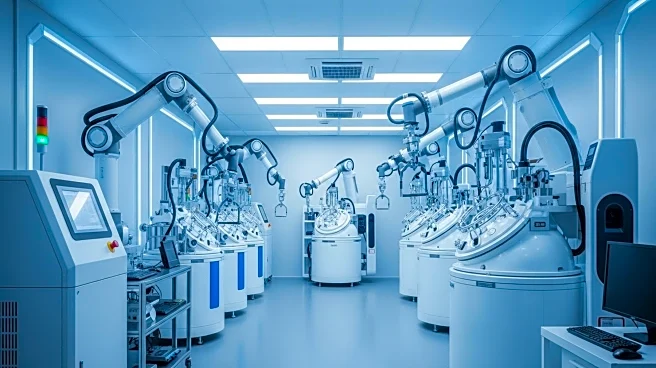What's Happening?
The cell therapy industry, particularly in the field of CAR T cell therapies for cancer, is facing challenges in scaling up manufacturing to meet global demand. Current centralized manufacturing models are not sustainable due to the high costs and logistical complexities involved in producing autologous cell therapies. These therapies require patient-specific cells, making proximity to patients crucial. A proposed solution is a regional manufacturing model, which involves establishing multiple high-capacity facilities that can serve as hubs for surrounding areas. This model aims to streamline processes, reduce turnaround times, and improve accessibility while maintaining high-quality standards.
Why It's Important?
The shift to a regional manufacturing model could significantly impact the cell therapy industry by making treatments more accessible and cost-effective. This approach addresses the limitations of both centralized and fully decentralized models, offering a balanced solution that enhances scalability and consistency. By reducing logistical barriers and improving process control, regional manufacturing could accelerate the development and commercialization of cell therapies, ultimately benefiting patients with rapidly progressing diseases. The model also presents opportunities for technological innovation and regulatory collaboration, which are essential for the industry's growth.
What's Next?
The implementation of regional manufacturing hubs will require strategic investments in infrastructure and technology. Collaboration with regulatory bodies, such as the FDA, will be crucial to ensure compliance and establish comparability across sites. The industry may also see increased partnerships between hospitals and manufacturing hubs to streamline operations. As the model gains traction, it could set a precedent for other sectors facing similar scalability challenges, potentially leading to broader changes in manufacturing practices across the biotech industry.
Beyond the Headlines
The move towards regional manufacturing highlights the evolving landscape of the biotech industry and the need for innovative solutions to meet growing demand. It also underscores the importance of regulatory engagement and the role of advanced manufacturing technologies in shaping the future of healthcare. The success of this model could influence other areas of medicine, encouraging a shift towards more localized and patient-centric approaches to treatment.











